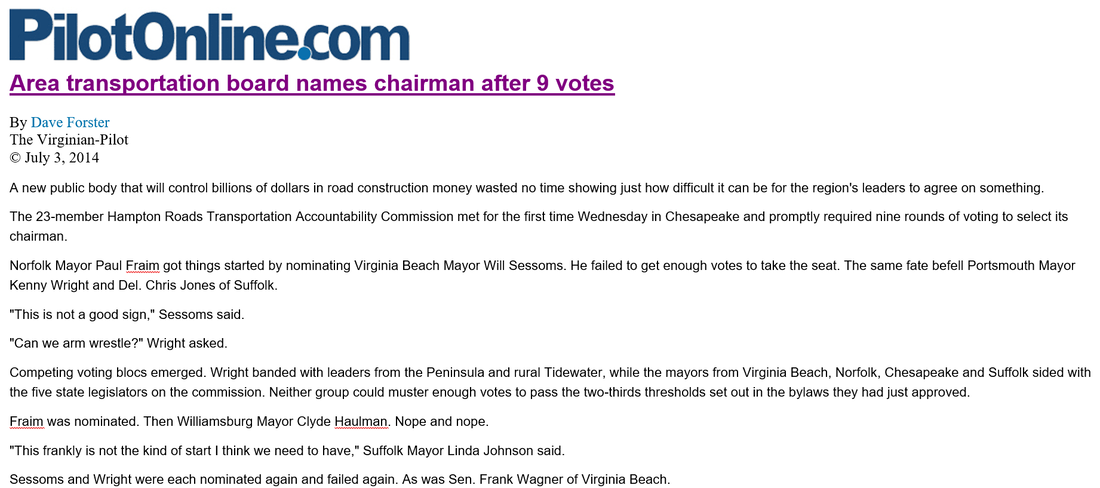| Government control of roads will never be better than the free enterprise system. Even if the most experienced big business CEO with significant road experience ran this board, without free market benefits and competition, the endeavor would fail to achieve the best results. A person whose time is split between a chiropractic business, a mayor’s responsibility and an upcoming reelection campaign, just would not have the time or expertise to oversee such a large budget. Without claiming corruption, someone seeking reelection and having this level of oversight of billions of dollars of road contracts will have plenty of people wanting to stay on his good side. |
Area transportation board names chairman after 9 votes
By Dave Forster
The Virginian-Pilot
© July 3, 2014 A new public body that will control billions of dollars in road construction money wasted no time showing just how difficult it can be for the region's leaders to agree on something.
The 23-member Hampton Roads Transportation Accountability Commission met for the first time Wednesday in Chesapeake and promptly required nine rounds of voting to select its chairman.
Norfolk Mayor Paul Fraim got things started by nominating Virginia Beach Mayor Will Sessoms. He failed to get enough votes to take the seat. The same fate befell Portsmouth Mayor Kenny Wright and Del. Chris Jones of Suffolk.
"This is not a good sign," Sessoms said.
"Can we arm wrestle?" Wright asked.
Competing voting blocs emerged. Wright banded with leaders from the Peninsula and rural Tidewater, while the mayors from Virginia Beach, Norfolk, Chesapeake and Suffolk sided with the five state legislators on the commission. Neither group could muster enough votes to pass the two-thirds thresholds set out in the bylaws they had just approved.
Fraim was nominated. Then Williamsburg Mayor Clyde Haulman. Nope and nope.
"This frankly is not the kind of start I think we need to have," Suffolk Mayor Linda Johnson said.
Sessoms and Wright were each nominated again and failed again. As was Sen. Frank Wagner of Virginia Beach.
The group finally agreed - with the exception of a dissenting vote from Franklin - on Chesapeake Mayor Alan Krasnoff.
The room filled with applause. Then, nominations for vice chair. Votes for Jones, Haulman, Hampton Mayor George Wallace and Del. David Yancey of Newport News came and went. The members settled on Wagner by a sudden voice vote.
One of the commission's voting thresholds gives greater weight to localities with larger populations, but the experience Wednesday showed that even a coalition of the region's largest cities will still need support from their smaller counterparts as they attempt to reshape Hampton Roads' transportation network.
The group was created by the General Assembly to choose which highway mega-projects to build with the revenue coming to Hampton Roads from regional sales and fuel taxes. The area expects to see $200 million a year, which could be leveraged into amounts several times greater than that with bonds.
The new commission also has the power to set tolls to help finance projects. Its next meeting is at 12:30 p.m. July 17 at 723 Woodlake Drive in Chesapeake.
Dave Forster, 757-222-5005, [email protected]
By Dave Forster
The Virginian-Pilot
© July 3, 2014 A new public body that will control billions of dollars in road construction money wasted no time showing just how difficult it can be for the region's leaders to agree on something.
The 23-member Hampton Roads Transportation Accountability Commission met for the first time Wednesday in Chesapeake and promptly required nine rounds of voting to select its chairman.
Norfolk Mayor Paul Fraim got things started by nominating Virginia Beach Mayor Will Sessoms. He failed to get enough votes to take the seat. The same fate befell Portsmouth Mayor Kenny Wright and Del. Chris Jones of Suffolk.
"This is not a good sign," Sessoms said.
"Can we arm wrestle?" Wright asked.
Competing voting blocs emerged. Wright banded with leaders from the Peninsula and rural Tidewater, while the mayors from Virginia Beach, Norfolk, Chesapeake and Suffolk sided with the five state legislators on the commission. Neither group could muster enough votes to pass the two-thirds thresholds set out in the bylaws they had just approved.
Fraim was nominated. Then Williamsburg Mayor Clyde Haulman. Nope and nope.
"This frankly is not the kind of start I think we need to have," Suffolk Mayor Linda Johnson said.
Sessoms and Wright were each nominated again and failed again. As was Sen. Frank Wagner of Virginia Beach.
The group finally agreed - with the exception of a dissenting vote from Franklin - on Chesapeake Mayor Alan Krasnoff.
The room filled with applause. Then, nominations for vice chair. Votes for Jones, Haulman, Hampton Mayor George Wallace and Del. David Yancey of Newport News came and went. The members settled on Wagner by a sudden voice vote.
One of the commission's voting thresholds gives greater weight to localities with larger populations, but the experience Wednesday showed that even a coalition of the region's largest cities will still need support from their smaller counterparts as they attempt to reshape Hampton Roads' transportation network.
The group was created by the General Assembly to choose which highway mega-projects to build with the revenue coming to Hampton Roads from regional sales and fuel taxes. The area expects to see $200 million a year, which could be leveraged into amounts several times greater than that with bonds.
The new commission also has the power to set tolls to help finance projects. Its next meeting is at 12:30 p.m. July 17 at 723 Woodlake Drive in Chesapeake.
Dave Forster, 757-222-5005, [email protected]

